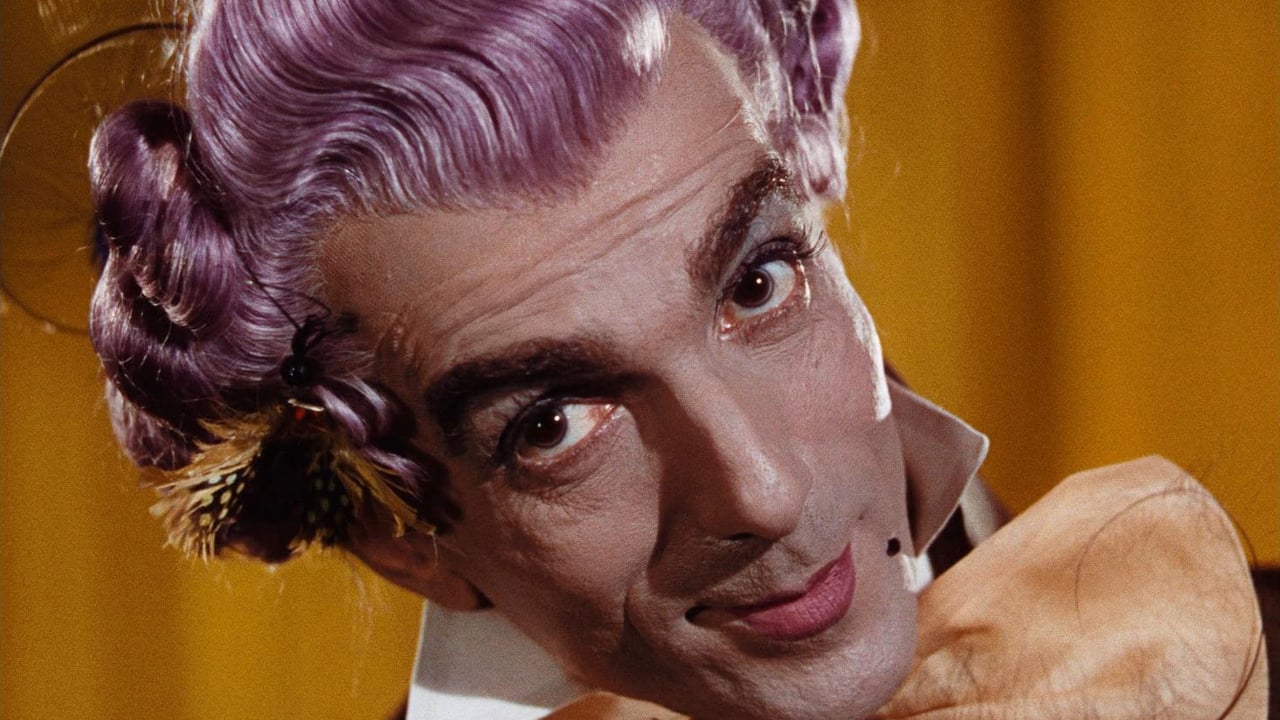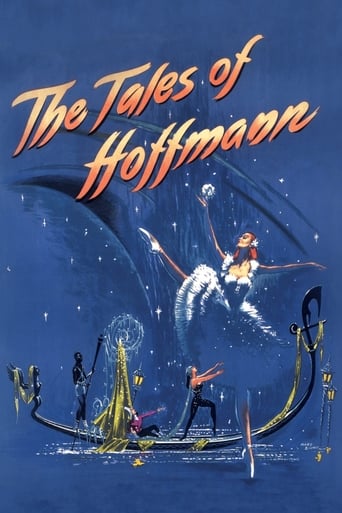



It is interesting even when nothing much happens, which is for most of its 3-hour running time. Read full review
View MoreThis is a small, humorous movie in some ways, but it has a huge heart. What a nice experience.
View MoreAmazing worth wacthing. So good. Biased but well made with many good points.
View Morewhat a terribly boring film. I'm sorry but this is absolutely not deserving of best picture and will be forgotten quickly. Entertaining and engaging cinema? No. Nothing performances with flat faces and mistaking silence for subtlety.
View MoreThis is a 4K restoration of directors-duo Powell and Pressburger's cinematic adaptation of Jacques Offenbach's eponymous opera about German Romantic author E.T.A. Hoffmann (Rounseville), attends a ballet performance by a prima ballerina Stella (Shearer), who intends to meet Hoffmann after the show, but the note is intercepted by his nemesis Councillor Lindorf (Helpmann), which leads Hoffmann to get intoxicated in a tavern and triggers his nostalgic recounts of three stories from his past lovers, Olympia (Shearer), Giulietta (Tchérina) and Antonia (Ayars), respectively these three operettas happen in Paris, Venice and an unknown Greek island.This is an excellent restoration to authentically register the movie's original theatrical opulence for opera die-hards to luxuriate in its live-emulating performances (although only tenor Rounseville and soprano Ayars can sing in their own voices, while other danseurs and danseuses have to all be dubbed in this case), it is an innovate endeavor to couple two different art media together at that time, when opera meets motion pictures, all the renditions can be rehearsed and redone to a fabricated perfection thanks to the snappy editing and the magic of montage, although sometimes Shearer is obviously not lip-syncing to the lyrics while ravishingly gyrating as the mechanical doll Olympia in the first story. Mainly as a ballet piece, the story of Olympia also consummately incorporates the utilisation of puppetry into its harlequin mise en scène. Unfortunately, the film gradually slumps to be enervating in the second story of Giulietta, although Tchérina strikes a fierce appearance as an exotic courtesan who makes a deal with an evil magician (Helpmann) to steal Hoffmann's reflection, but the fantasy ingredients never transpire to be an impressive cinematic manoeuvre itself apart from some rudimentary magic tricks to provoke eye-rolling for finicky viewers. What's more frustrating is that the opera pieces are far from supremacy, the narrative descends into hollowness and the melody doesn't effectively to our ear's rescue.Ultimately, the third story of Antonia comes to the nadir as it all relies on the singing, a soprano suffers from consumption and is forbidden to sing, but she is persuaded by an devilish doctor (Helpmann again) to belt out a dirge for herself. Strangely enough, all the way through, the film can only be occasionally captivating but uniformly no emotional vibrations are teased out, it seems that all its artsy charms are losing its mojo along its running time. This is the second Powell-Pressburger collaboration I've watched, as much as I adore BLACK NARCISSUS (1947), THE TALES OF HOFFMANN is subjected with a troubled transmutation from opera to the media of cinema, flashily dazzling but without a sounding frisson to win over audience who is not afraid to shrug off the high-art hypocrisy and spill one's true feelings about it.
View MoreThere's been a bit of a boom recently of picture houses like my local emporium showing beamed-back theatrical and operatic performances in a bid to broaden their audience base. The Tales of Hoffman tries to bring opera and ballet to the cinema similarly but instead stuffs the action directly onto the celluloid and invites you to don your theatre binoculars and enjoy. And I tried to enjoy it.After a slightly heart-sinking moment towards the end of the prologue, when I realised that there was to be no narrative dialogue whatsoever and that everything was going to be sung, in that caterwauly way, I relaxed into the first of the acts and it started to become something that I could appreciate more. The sets are quite deliberately stagey and story lines are simple but there's a nice undertone of humour to what you're seeing and the screeching settles down a little.However, it has to be said that there are sections still where things feel overlong and the third act in particular just felt drawn out and not in a good way. I've read this piece elsewhere described as being cold and I have to concur. The sets and the camera work are pretty good and even some of the singing, but it's hit or miss in its cohesion.I'm glad to have gone along to watch and there were elements that worked very well, but as a whole, it wouldn't be something that I would rush to pay to see again.
View MoreThis is one of those films you always return to, and should return to at least once a year, a phantasmagoria of artistic ambitions galore, a combined opera-ballet and film of highest technical standards of the time and well ahead of its time, receiving little acclaim and understanding in 1951 but the more so the more it has aged and proved its timelessness. The sumptuous settings, the dazzling fireworks of perpetual innovation and imagination, the splendid acting by above all Robert Helpmann, Leonide Massine, Ludmila Tcherina, Pamela Brown and Moira Shearer, the brilliant choreography all the way, all this and much else must make this film a peak of its kind in film history, since filmed and danced operas are not very common, and this one never loses in style or sustainment. Operas usually suffer from long transportation sequences, it's impossible to find an opera without boring ingredients, but this one, although slow at times in its subordination to the music, never loses its grip on the presentation. It would be recommended to the viewer, though, to take a break before the second act, because the imagery is so loaded with colourful feasts for the eye as well as for the ear, so it might feel a bit thick, like too sumptuous a banquet. The only possible objection I have found to venture against this film (after having seen it three times) is Robert Rounseville as Hoffmann. His voice is wonderful and couldn't be better, but the Hoffmann character was a bit less sturdy and complacent - the extremely intensive and high-strung E.T.A.Hoffmann with constantly too many professions on his hands at the same time, all creative, was a little more delicate and liable than the very sound and solid Rounseville - but this is just a detail. The film definitely deserve ten points.A curiosity: Lazzaro Spallanzani, an important part in the first act played by Leonide Massine, was like Hoffmann himself a very real character, a medical universal genius and Hoffmann's colleague, who happened to die today (11.2) in 1799.
View MoreWithout repeating the data and background of this film let me just state that in my humble view it sets a unique standard for lovers of E.T.A. Hoffman, Offenbach and/or this particular operatic work of Offenbach. I saw this one while quite young and in the ensuing half century at least a dozen productions both recorded and live including a good one from the NY Metropolitan Opera just yesterday and while all were enjoyable (you cannot fault a professional presentations of its music) none rise to the towering level of this British production from 1951 for sheer beauty and creative imagery on every level of production and casting. Since it was done with otherworldly imagination it, curiously and uniquely, defies dating.In other words, the combination of visuals and performances both physical and oral stand as matchless by the others I have since experienced. Since the intellectual and aesthetic requirements of mass audiences have since greatly diminished it's very unlikely that we will in the foreseeable future ever see any production of this opera on film to come anywhere near to this one. If you can locate the DVD somewhere and are taking the time to read this, grab it.
View More